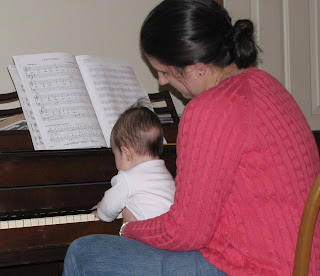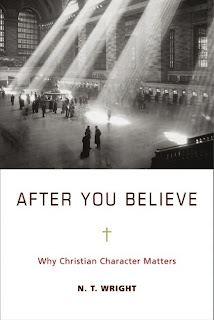I was writing last week about discipleship, about how we form our character. N.T. Wright says that we form our character by a long, slow change of deep, heart-level habits. Hard work up front to make small deliberate choices. These choices feel awkward and unnatural at first, but they allow the Holy Spirit to form our character. This week, I want to write about why our character matters so much.
Of course, if you believe that after we die is that we leave this earth and rest and relax with Jesus for all of eternity, then there is not much reason to develop our character. If, however, you believe (as I believe the Bible teaches) that God will give creation a complete makeover so that it is filled with the glory of God and that we will be given new bodies to live with delight and power in God’s new world, well, then the development of our character becomes very important indeed.
Jesus talks often of the Kingdom of God or the Kingdom of Heaven, implying that it is already here. That the transformation of our world and of ourselves has already begun in Jesus! This is huge. This is why what I do, what my character is, matters: because my character, the virtues that I practice and choose, every moment of every day, is permanent. It does not only last for this life, but for all of eternity.
Let me repeat the C.S. Lewis quote from last week:
every time you make a choice you are turning the central part of you, the part of you that chooses, into something a little different than it was before. And taking your life as a whole, with all your innumerable choices, all your life long you are slowly turning this central thing into a heavenly creature or a hellish creature: either into a creature that is in harmony with God, and with other creatures, and with itself, or else into one that is in a state of war and hatred with God, and with its fellow creatures, and with itself. Each of us at each moment is progressing to the one state of the other.
We are preparing ourselves for the day we become truly human.
As I have written about before, here and here, our ultimate goal is a dual one: to be stewards of God’s rule and care of creation and to reflect creation’s praise and worship back to God. This is achieved by having a character of holiness brought about by the Holy Spirit and our choices (Romans 8.12-17) and by prayer, as the Spirit helps us intercede for the whole world (Romans 8.26-27).
We begin this now, and it is the permanence of virtue, lasting not just for this age but into the age to come, that makes character worthwhile to work at. These virtues will last: In I Corinthians 13 it says:
…where there are prophecies, they will cease; where there are tongues, they will be stilled; where there is knowledge, it will pass away. For we know in part and we prophesy in part, but when perfection comes, the imperfect disappears…And now these three remain: faith, hope and love. But the greatest of these is love.
Some things will not last, but others will.
Always give yourselves fully to the work of the Lord, because you know that your labor in the Lord is not in vain. ~ I Corinthians 15.58
This is why working at forming our character, working at developing virtues, is worthwhile. Because this is what will last. This is what prepares us for all of eternity.
Virtue is…part of the life of the future breaking in to the present. That is why it is both hard and glorious work. ~ N.T. Wright
One last reason why building our character is so important: When the Christian community, the Church, is truly striving after virtues (faith, hope and love) and working hard to produce fruit of the Spirit, it has a huge apologetic value. It shows the watching world a new way of being human. A Church that looks like this is a missionary body which puts forward the purpose of God to the world.
Discipleship is hard. It is well worth the effort and sacrifice! So I will try to keep making those small, daily choices, those choices that now seem so awkward and false. Will you keep going too? It will get easier.
And someday, who knows? You might be mistaken for a native of God’s kingdom.












